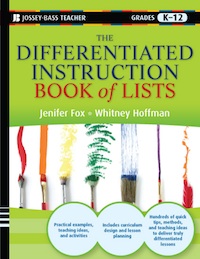Differentiating Instruction and Assessments
There was an interesting note on Mashable this morning about a new iPad app that not only saves your child’s artwork, but allows them to talk about their artwork and record that at the same time. This made me think that while this is logical progression technology-wise, it’s leaps ahead of where we are in terms of differentiating assessments for kids, and adults alike.
We’re getting better and better about helping teachers understand how to differentiate the delivery method of education- ie teaching to different learning styles, but when it comes to assessment, we’re still largely behind in understanding what a child learns and takes away from the classroom and the work we assign them.
A teacher I know recently had her class contact a prescreened list of adults, to ask them about the creative process they used in their careers, or make something themselves and describe the creative process they used. This was an attempt to try to get the kids to see the similarities in the writing process and the creative process, and how these same “tools” were in use long after the classroom was nothing more than a memory. It was a great project, but as would be expected, some kids invented new devices, some did do interviews, and others made duct tape wallets or other small craft projects. I hope in the end, each child took something away from the experience, but I wonder whether grading their writing samples about their creative process and that reflection may not have been better served by something like a video or an iphone app where kids would talk and record their process as it took shape, and as ideas were considered, discarded, changed, bounced around, etc. culminating in the final product.
I think we’re on the cusp of really figuring out how kids are thinking and absorbing what we’re trying to get them to understand and appreciate. When we figure out how to truly differentiate the assessment of students, we may finally begin to make more headway in making school and the lessons we want them to learn more meaningful and personal. However, it takes so much more work on everyone’s part to truly evaluate learning. Grades, tiers, and other numerical classification systems are just too easy, and they won’t go away any time soon, even if the meaningful evaluation of the creative process is becoming easier to document every day.





